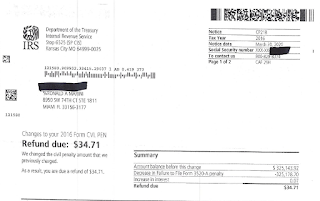According to Law360, despite speculation of an imposed settlement range, the IRS Independent Office of Appeals doesn't have mandated settlement ranges for penalties involving some international related tax returns, appeals officials said Tuesday.
No national settlement range exists for penalties related to Forms 5471 or 5472, Elizabeth Askey, deputy chief of the Internal Revenue Service appeals office, said on a panel during a tax conference hosted by the Federal Bar Association and broadcast online.
"Each Of These Cases Is Worked On Its Own Merits,
And The Appeals Officer Will Consider All The
Applicable Penalty Relief Criteria," She Said.
Those criteria include reasonable cause and litigation hazards, Askey said. She made those comments in connection with a Dec. 7 memo for IRS appeals office employees working international penalties. It says first-time abatement waivers generally aren't available for relief from international penalties addressed in the Internal Revenue Manual. However, the memo adds an exception for technical workers to allow them to consider and recommend granting first-time abatement penalty relief on some systematically assessed penalties for filers of Forms 5471 and 5472, which are information returns.
Form 5471 is for U.S. persons regarding certain foreign corporations. Form 5472 is for 25% foreign-owned U.S. corporations or foreign corporations engaged in U.S. trades or businesses under Internal Revenue Code Sections 6038A and 6038C.
The memo removes an inconsistency between the penalty-and-interest section and the appeals section of the Internal Revenue Manual, Askey said, adding that the appeals section had said first-time abatement wasn't available for Form 5471 and 5472 penalties.
Joshua Wu of Latham & Watkins LLP called the move to align the international penalty and appeals sections helpful for taxpayers with Form 5471 and 5472 penalty cases in IRS appeals.
"And because the penalty applies for each foreign corporation, they can add up quickly if a taxpayer has multiple 5471 filing requirements," Wu said. "First-time abatement relief is especially useful for otherwise compliant taxpayers who may have yet to become familiar with the complex international reporting rules and failed to file a Form 5471."
The IRS provided Law360 with the memo but declined to comment further. The memo doesn't address Form 3520, which is used to report transactions with foreign trusts and receipt of certain foreign gifts, or Form 3520-A, the annual information return for a foreign trust with a U.S. owner.
However, Andy Keyso, chief of the appeals office, referred to those forms and said he hears the same speculation regarding a national settlement range being imposed by the IRS or that the office is imposing on its officers.
"There Is Certainly No Settlement Policy Imposed By
IRS Or Imposed By Appeals That Our Appeals Officers
Are Restrained By Here,"
Keyso Said During The Panel. "
They Truly Do Look At What Are The
Facts In Each Particular Case."
National Taxpayer Advocate Erin Collins, in her 2020 Annual Report to Congress, listed the agency's assessment of international penalties as one of the most serious problems facing taxpayers. Her report said the agency's treatment of foreign information reporting penalties under Sections 6038 and 6038A as systemically assessable wasn't legally supportable, was administratively problematic, and hit taxpayers with stress, costs and delays.
There are late-filing penalties under Section 6038 for Form 5471 and under Section 6038A for Form 5472, and for at least the last decade the IRS has automatically imposed them for late original corporate and partnership income returns that included them, Matthew Cooper, a managing director with Deloitte Tax LLP's Washington national tax group, told Law360. Cooper was a panelist Tuesday.
Jason B. Freeman of Freeman Law PLLC told Law360 that the idea of a national settlement range is a major concern for him and that he believes speculation regarding it comes from observations in practice.
"It's a phenomenon that, whether deliberate or not, though I largely believe it's deliberate, is a natural consequence of centralizing the review through the use of technical experts," he said. "Practitioners commonly hear appeals officers refer to the position taken by a 'technical expert.'"
Need an FBAR Penalty Relief Problem?
Contact the Tax Lawyers at
Marini& Associates, P.A.
for a FREE Tax Consultation at:
Read more at: Tax Times blog















